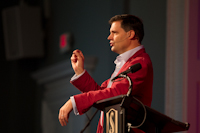Dr. Peter Williams Disputes Moral Objections to the Old Testament
January 19, 2017

 Southeastern Baptist Theological Seminary (SEBTS) was thrilled to welcome Dr. Peter Williams for his first visit to campus. He is the Warden (CEO) of Tyndale House in Cambridge, U.K., a world-leading evangelical center for biblical research. Williams earned his Ph.D. at Cambridge University and is a widely travelled speaker, as he lectures throughout the United States and Europe.
Southeastern Baptist Theological Seminary (SEBTS) was thrilled to welcome Dr. Peter Williams for his first visit to campus. He is the Warden (CEO) of Tyndale House in Cambridge, U.K., a world-leading evangelical center for biblical research. Williams earned his Ph.D. at Cambridge University and is a widely travelled speaker, as he lectures throughout the United States and Europe.
Williams was the Page Lecture guest speaker and spoke in Binkley Chapel on Sept. 24 and 25. The Page Lectures bring outstanding theologians to the SEBTS campus each fall to deliver two lectures on a subject of concern to the Christian community.
He focused his lectures on the subject of moral objections to the Old Testament. “This is a major way people are attacking the scriptures today,” said Williams. He began by looking at the vital concept of trust. “We can have a trust in God that is not shaken by tough situations,” said Williams.
During his first lecture, religion and violence were two topics that Williams discussed. “One of the main objections against the Old Testament is the objection of violence, which we will talk about today, and tomorrow we will look at the question of slavery,” said Williams.
Williams mentioned Richard Dawkin’s work, “The God Delusion,” which supports atheism and is in contrast with William’s beliefs. “Atheist think the only thing a person has is their life,” said Williams. “Atheists launch two attacks at once, it didn’t happen and it’s unfair. … Christian morality seems strange to atheist because we believe different things about the universe. … The physical understanding of the universe affects things.”
This lecture also explored the idea that God cannot contradict Himself. “There is an infinite list of things that God can’t do. … God can’t just make wrong, right,” said Williams. “There are certain things you can do when you have authorization. … In the particular situation of taking someone’s life, there is one person who is able to authorize the taking of life, the Author of all life.”
“Knowing the future can make things morally okay,” said Williams. “God with all future knowledge can authorize events because He knows their out working.”
For his second lecture, Williams taught on the moral objection to slavery in the Old Testament. He spoke about how the word ‘slave’ is not inherently negative in the Old Testament and explored its frequency in the Bible over time in different translations and languages. In the earlier translations, the word ‘slave’ was used very rarely compared to modern translations of today. The Hebrew word can be translated as both servant and slave as it relates to work, subservience or serving a king.
Also, it was pointed out that most people misinterpret the book of Exodus. There is no language of liberation but of bringing out according to Williams. Additionally, Williams supported his argument by looking at the time before the fall of man where there was no dominion of one human over another.
Furthermore, Williams said: “I think what we don’t see here is the idea of tradesmen selling people.” He compared conditions and legal rights of slaves in early history until modern day. “Factor out the Greco-Roman idea of slavery in the Old Testament, that hadn’t happened yet,” said Williams.
Williams concluded his talk with the fundamental truth from 1 Corinthians 7:22, “For the one who was a slave when called to faith in the Lord is the Lord’s freed person; similarly, the one who was free when called is Christ’s slave.” He also encouraged the students to continue to research ideas from his lecture and closed with affirming his stance on the topic. “I encourage you to believe that there are not really any moral objections in the Old Testament,” said Williams.
To listen to or view these lectures online, please click here.
To view photos from chapel please click here.